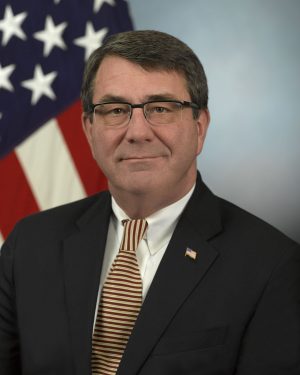A few defense and security links to wrap up the week:
Following U.S. Secretary of Defense Chuck Hagel’s surprise resignation, the White House has been scrambling to find a replacement. After several prominent individuals took themselves out of consideration for the post, word on the D.C. street is that Deputy Secretary of Defense Ashton Carter will be picked to succeed Hagel. Naturally, there’s a lot of writing out there taking a look at what Carter would bring to the job. See Defense News, Foreign Policy, and Politico. While Carter will likely be far less interested in the Asia rebalance than was Hagel on a personal level, he isn’t entirely an unknown figure on Asia-Pacific issues. Speaking in Jakarta, Indonesia in early 2013, Carter described the United States’ interests in Asia in a speech entitled “The Rise of Asia and New Geopolitics in the Asia-Pacific Region.” That speech is well worth a read to get a better sense of Carter’s approach to Asian issues.
Adm. Harry Harris Jr., the United States’ incoming Pacific commander, highlighted North Korea as the “most volatile and dangerous threat” for the United States at his confirmation hearing before the U.S. Senate Armed Forces Committee. Highlighting North Korea’s continuing nuclear weapons and ballistic missile development programs, Harris described North Korea as his “No. 1 security concern” and something that “keeps [him] up at night.” “Forward-based and forward-deployed U.S. military presence in the Western Pacific will continue to reassure our treaty allies and deter aggression by North Korea. If this fails, I will ensure Pacific Command forces are prepared to fight and defeat North Korean forces,” he added in his statement before the Senate. Harris’ comments came shortly after Gen. Curtis Scaparrotti, commander of U.S. Forces Korea (USFK) emphasized North Korea’s progress on asymmetric military capabilities in speech in Seoul.
Speaking of North Korea, CNBC has a report up on North Korea’s “elite cyberwarfare unit.” The report is all the more pertinent after an alleged cyberattack on Sony Pictures originating in North Korea. Cyber is one of the major asymmetric warfare pursuits of the North Korean regime. North Korea has targeted South Korean financial institutions and infrastructure with cyberattacks in the past and has the capabilities to stage attacks against U.S. firms. North Korea has not yet commented on the cyberattack against Sony Pictures.
At a time when tensions remain high between NATO states and Russia, a Norwegian F-16 almost collided with a Russian MiG-31. The incident was caught on tape. Dangerous flybys seem to be growing more and more common these days.
According to a U.S. cyber security firm, a group of Iranian hackers was able to breach the U.S. Navy-Marine Corps Intranet, U.S. defense firms, airlines, and energy companies. According to a Defense News report, the cyberattack is a bid to “retaliate against Western cyber attacks on its nuclear program.”
Over at War on the Rocks, Jason Campbell evaluates the prospects for the Afghan National Security Forces to be able to adequately handle the growing set of security challenges that lie in wait as U.S. and NATO troops largely depart at the end of the year. The piece is the third in a series; part one looked at what the new Afghan government is planning in terms of managing the security situation, and part two looked at NATO’s plans going forward into 2015.
Finally, if you haven’t already read it, T.X. Hammes has a feature piece in our new app-based magazine in which he argues that the U.S. military needs to rethink its procurement strategy. You can read an excerpt on our website. Finish the article on a variety of platforms including iOS, Android, and Google Play.
































